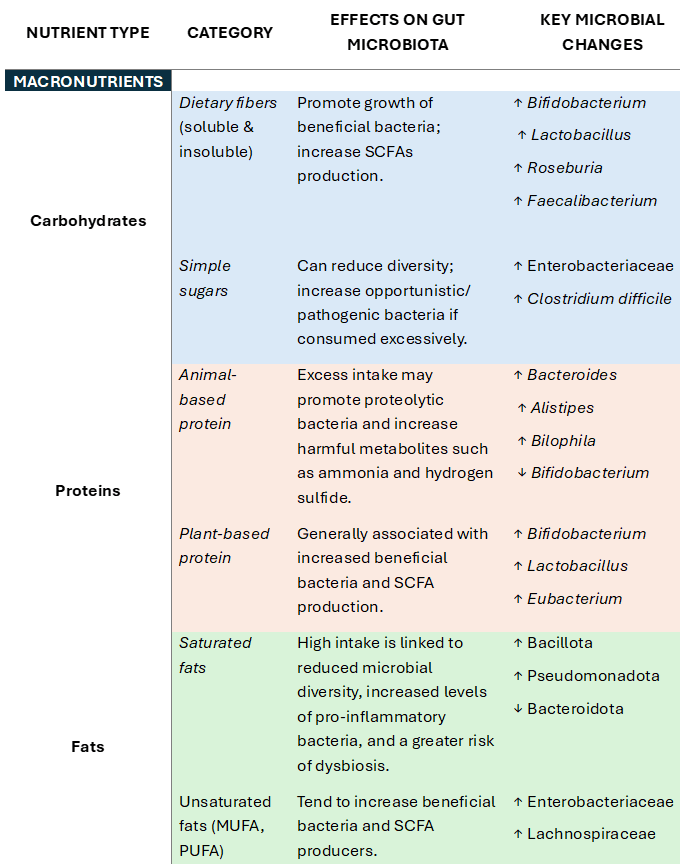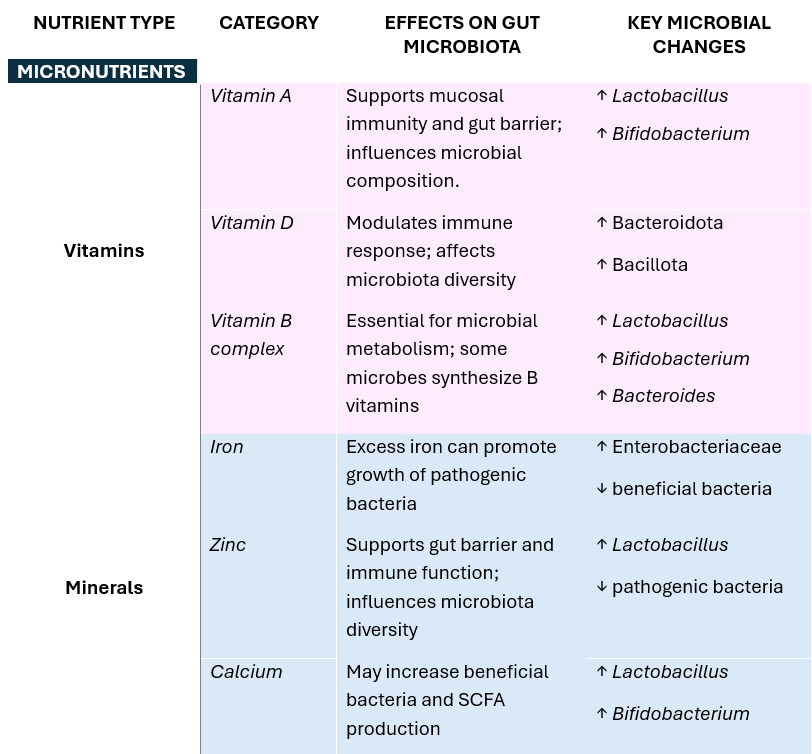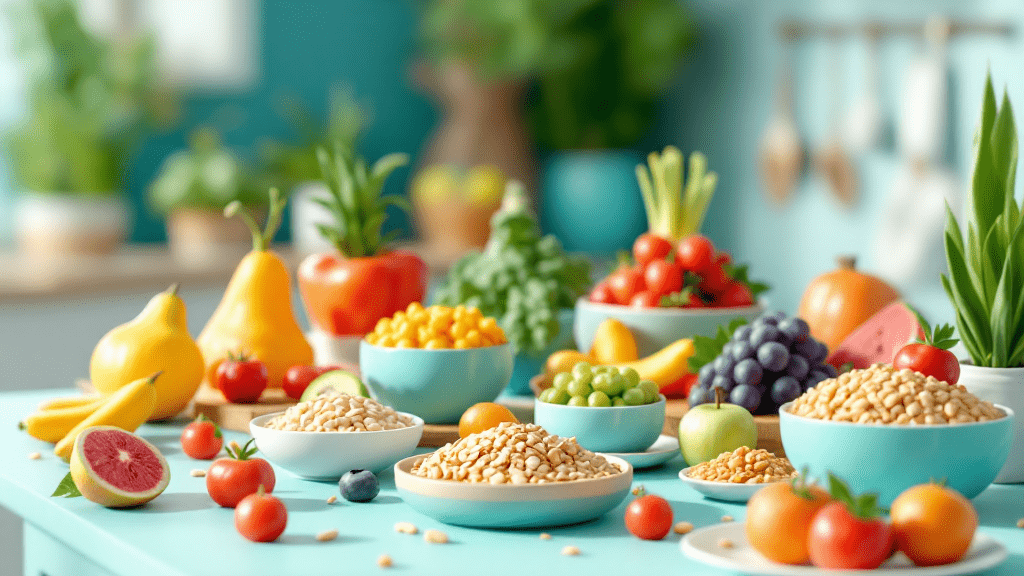Diet is one of the most influential and immediate factors shaping the composition and function of the gut microbiota. Nutritional intake can rapidly alter microbial diversity, metabolic activity, and overall ecosystem balance—impacting health outcomes, disease susceptibility, and nutrient processing. Understanding these dynamics is essential for advancing personalized nutrition and microbiome-based interventions.
Curious about how your diet affects your gut microbes?
The table below outlines how different nutrients—from fibers to fats—can shape the microbiome in distinct ways (Rinninella et al., 2019; Rinninella et al., 2023; Rowland et al., 2017; Zmora et al., 2018).


The fermentation of dietary fiber by gut microbiota leads to the production of short-chain fatty acids (SCFAs), such as butyrate, which play a critical role in maintaining gut health, modulating metabolism, and reducing inflammation (Hills et al., 2019; Portincasa et al., 2022; Rowland et al., 2017).
Dietary patterns significantly influence the composition and function of the gut microbiota. For instance, adherence to a Mediterranean diet promotes the growth of beneficial microbial communities, while Western dietary patterns are often associated with microbial imbalances that increase disease risk (Rinninella et al., 2019; Zmora et al., 2018; Rinninella et al., 2023; Perler et al., 2022). These diet-induced shifts do not occur in isolation; host factors—such as immune responses and gut barrier integrity—interact with dietary inputs to further shape microbial ecosystems (Lee et al., 2022; Hasan & Yang, 2019; Chang & Kao, 2019).
Alterations in the gut microbiota driven by poor dietary habits have been linked to a range of chronic conditions, including obesity, type 2 diabetes, inflammatory bowel disease, and mental health disorders (Hills et al., 2019; Zmora et al., 2018; Rinninella et al., 2023; Perler et al., 2022; Portincasa et al., 2022; Campbell et al., 2023; Van De Wouw et al., 2017). Conversely, restoring microbial diversity through a fiber-rich, plant-based diet has shown promise in rebalancing the gut microbiota and improving metabolic and inflammatory outcomes (Hills et al., 2019; Rinninella et al., 2019; Rinninella et al., 2023; Perler et al., 2022).
REFERENCES
Campbell, C., Kandalgaonkar, M., Golonka, R., Yeoh, B., Vijay-Kumar, M., & Saha, P. (2023). Crosstalk between Gut Microbiota and Host Immunity: Impact on Inflammation and Immunotherapy. Biomedicines, 11. https://doi.org/10.3390/biomedicines11020294
Chang, C., & Kao, C. (2019). Current understanding of the gut microbiota shaping mechanisms. Journal of Biomedical Science, 26. https://doi.org/10.1186/s12929-019-0554-5
Hasan, N., & Yang, H. (2019). Factors affecting the composition of the gut microbiota, and its modulation. PeerJ, 7. https://doi.org/10.7717/peerj.7502
Hills, R. D., Jr, Pontefract, B. A., Mishcon, H. R., Black, C. A., Sutton, S. C., & Theberge, C. R. (2019). Gut Microbiome: Profound Implications for Diet and Disease. Nutrients, 11(7), 1613. https://doi.org/10.3390/nu11071613
Lee, J., Tsolis, R., & Bäumler, A. (2022). The microbiome and gut homeostasis. Science, 377. https://doi.org/10.1126/science.abp9960
Perler, B., Friedman, E., & Wu, G. (2022). The Role of the Gut Microbiota in the Relationship Between Diet and Human Health. Annual Review of Physiology. https://doi.org/10.1146/annurev-physiol-031522-092054
Portincasa, P., Bonfrate, L., Vacca, M., De Angelis, M., Farella, I., Lanza, E., Khalil, M., Wang, D., Sperandio, M., & Di Ciaula, A. (2022). Gut Microbiota and Short Chain Fatty Acids: Implications in Glucose Homeostasis. International Journal of Molecular Sciences, 23. https://doi.org/10.3390/ijms23031105
Rinninella, E., Cintoni, M., Raoul, P., Lopetuso, L., Scaldaferri, F., Pulcini, G., Miggiano, G., Gasbarrini, A., & Mele, M. (2019). Food Components and Dietary Habits: Keys for a Healthy Gut Microbiota Composition. Nutrients, 11. https://doi.org/10.3390/nu11102393
Rinninella, E., Tohumcu, E., Raoul, P., Fiorani, M., Cintoni, M., Mele, M., Cammarota, G., Gasbarrini, A., & Ianiro, G. (2023). The role of diet in shaping human gut microbiota. Best Practice & Research. Clinical Gastroenterology, 62–63, 101828. https://doi.org/10.1016/j.bpg.2023.101828
Rowland, I., Gibson, G., Heinken, A., Scott, K., Swann, J., Thiele, I., & Tuohy, K. (2017). Gut microbiota functions: metabolism of nutrients and other food components. European Journal of Nutrition, 57, 1–24. https://doi.org/10.1007/s00394-017-1445-8
Van De Wouw, M., Schellekens, H., Dinan, T., & Cryan, J. (2017). Microbiota-Gut-Brain Axis: Modulator of Host Metabolism and Appetite. The Journal of Nutrition, 147(5), 727–745. https://doi.org/10.3945/jn.116.240481
Zmora, N., Suez, J., & Elinav, E. (2018). You are what you eat: diet, health and the gut microbiota. Nature Reviews Gastroenterology & Hepatology, 16, 35–56. https://doi.org/10.1038/s41575-018-0061-2

